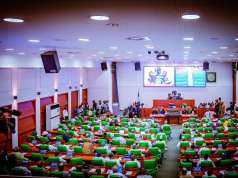Governor of the Central Bank of Nigeria (CBN), Olayemi Cardoso, has defended the apex bank’s decision to relocate some of its departments to Lagos.
Cardoso spoke Monday in an interview with Arise TV.
According to him, the relocation would help to decongest the headquarters of the bank in Abuja.
He expressed his dissatisfaction with the criticisms of the plan by some Nigerians.
The development has been condemned by some groups and notable individuals in northern Nigeria.
The affected departments are Banking Supervision, Other Financial Institutions Supervision, Consumer Protection Department, Payment System Management Department, and Financial Policy Regulations Department.
Over 1,500 among workers at the CBN headquarters were affected by the move.
Speaking during the interview, the CBN gov said, “I think there’s been an attempt to sensationalise what is a normal process for any vibrant entity like a central bank. Bear in mind that as a national institution, the central bank has a presence in every state of the federation.
“A situation where a large number of technical skills are in one particular location to the detriment of others does not speak well. So this has been an attempt to realign that and to ensure that skills are moved from where there’s an overabundance to where there’s a great shortage of those skills. So that’s basically what that is about.
“And with respect to Lagos which you mentioned, from our perspective, it makes a lot of sense that the entities which we are attempting to regulate and need to be on top of that are based in Lagos and they should have the right skills from the central bank right next to them so they can adequately and effectively do their jobs.
“It (The CBN headquarters) is overpopulated. And with what we are doing right now, we are hoping that will also help in easing the issue of overpopulation, which it is.
“And quite frankly, anybody that comes to the bank and interacts on that level will see that it is. It is overpopulated. And we’ve got to ensure that we can manage potential issues that could fall out from an overpopulated environment.”










